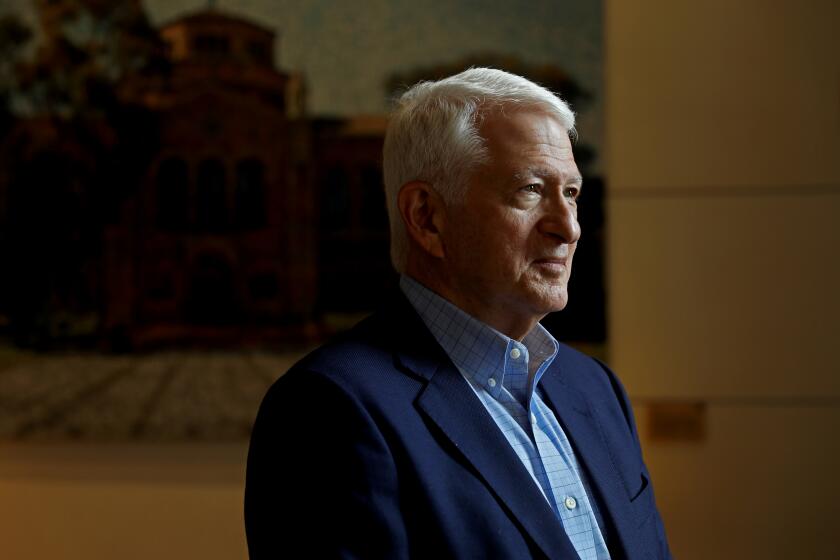Task Force to Analyze Guardian System
California Chief Justice Ronald M. George appointed a special task force Friday to investigate the state’s troubled conservatorship system, saying it is imperative to protect the elderly from abusive and unethical conservators.
The 16-member panel, headed by a senior appellate judge, will have broad authority to examine how courts monitor conservators and to recommend changes to the state Judicial Council, which could order reforms on its own.
“We’re really dealing with individuals who are among the most vulnerable members of our society,” George said in an interview. “I think there has to be real accountability through the court system for what is done by conservators.”
A four-part series published by The Times in November highlighted neglect and abuse by professional conservators and lax oversight by the courts.
Conservatorship began as a way for families to help frail, failing relatives but has become a growing business in California as the population ages and families disperse.
Today, about 500 professional conservators operate in the state, caring for at least 4,600 people and managing $1.5 billion in assets.
Elder-rights advocates and a past president of the group that represents professional conservators applauded George’s move but questioned why the task force included only judges and state court employees and not a single conservator or elder-care activist.
“Overall, it’s very good news,” said Patricia McGinnis, executive director of the California Advocates for Nursing Home Reform. “But they really need to hear from people and from advocates who have worked in this system on behalf of consumers.”
George said the panel would ask conservators, elder-rights advocates and seniors themselves for their thoughts on what changes needed to be made.
In recent weeks, three state lawmakers have introduced bills in an attempt to regulate professional conservators, including one that would license them and create a state ombudsman to investigate complaints.
But George, who said he limited the task force’s membership to speed its deliberations, is in a unique position to change the way conservators are monitored through changes in court rules and procedure.
George is chairman of the state Judicial Council, which could, for example, implement rules to greatly curtail the probate courts’ current practice of appointing conservators on an emergency basis. The Times found emergency appointments often come without proper notice to the elderly.
George said he expects the task force’s findings to lead to important changes in court procedure. Probate courts appoint conservators and, in the absence of state regulation, are the only bodies that oversee their work and discipline unethical and abusive practitioners.
“This isn’t just a group that will file a report that will go nowhere,” George said of the statewide panel.
The state’s conservator system is so underfunded and overwhelmed that court officials do not even know how many incapacitated adults are under conservatorship. Estimates range from 33,000 to 44,000, but officials cannot be more precise than that because no agency tracks active cases.
George said that he previously had concerns about how the courts were handling conservatorships but acted swiftly to investigate them after The Times’ series was published.
“The series in the Los Angeles Times raised everyone’s consciousness and certainly caused me to put it on the front burner,” he said. “I think we would have taken some examination, but the articles really served to illustrate that it should be a top priority and given immediate attention.”
The Times’ investigation found that professionals often gain legal authority over elderly men and women without their consent, swiftly taking control of their lives and finances. Some neglected or isolated their wards and ran up excessive fees. Meanwhile, probate courts overlooked incompetence, neglect and outright theft.
Despite George’s concern about the conservatorship system, the state’s 58 county courts have been slow to embrace reform. In November, The Times revealed that only 13 counties had even signed up to make use of a statewide registry to track abusive conservators, as required by law.
Since then, only 10 more have joined the registry, leaving more than half of all the state’s county courts without access.
“There’s definitely a need for improvement,” George said. “I think it would be hard to quarrel with that.”
The task force will study reforms in other states and make recommendations for new legislation, court rules and funding needed to fix problems. In addition, the group will analyze bills currently working their way through the state Legislature. Roger W. Boren, the administrative presiding justice of the Court of Appeal’s 2nd District in Los Angeles, will serve as chairman of the task force.
A former deputy attorney general who successfully prosecuted “Hillside Strangler” Angelo Buono Jr. in the early 1980s, Boren said he had recently noticed conservatorship appeals that troubled him, including cases that did not win on appeal.
“My colleagues and I would sometimes say, ‘That guy can’t prove his case, but there’s something wrong here,’ ” he said. “We worried about that.”
The panel is expected to hold its first meeting next month to plan its activities. Boren said it probably will hold hearings across the state in the next few months before submitting a preliminary report by the fall.
Boren compared his task to the one carried out by the Judicial Council in reforming children’s dependency courts over the last decade. He said that those courts, which decide whether to place children in foster and adoptive homes, were considered inferior assignments by many judges and were sometimes used as “dumping grounds” for poorly performing jurists.
But enhanced resources and training for judges in recent years have helped improve the reputation of dependency courts and reduce turnover of judges, Boren said.
“It’s just a whole sea change in that environment,” he said. “That’s probably what needs to take place here.”
More to Read
Get the L.A. Times Politics newsletter
Deeply reported insights into legislation, politics and policy from Sacramento, Washington and beyond. In your inbox three times per week.
You may occasionally receive promotional content from the Los Angeles Times.







